Related Topics
Benjamin Franklin
A collection of Benjamin Franklin tidbits that relate Philadelphia's revolutionary prelate to his moving around the city, the colonies, and the world.
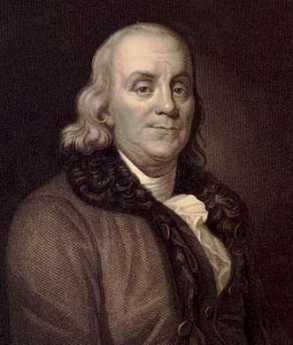
Philadelphia Economics
economics
Causes of the American Revolution
Britain and its colonies had outgrown Eighteenth Century techniques of governance. Unfortunately, both England and America lacked the sophistication to make drastic changes smoothly.
Parliament Provokes a Revolution
In some medical circles, it is postulated that George III was psychotic, possibly suffering from an inherited rare condition called porphyria.
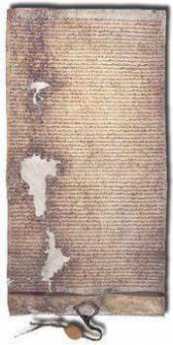
|
| Magna Carta |
That's pretty conjectural, but it is certainly true that his mother egged him on to be a real king, a real force reversing that steady decline in the Monarchy's personal power which began with the Magna Carta. By the time in question, however, so much power had already gravitated into the hands of Parliament that the King could not act in any major way without their consent. Even today, Cabinet Ministers are spoken of as King's ministers but are in fact appointed by leaders of the majority party in Parliament. Some in Parliament, like Edmund Burke, were almost persuasive in resisting the Ministry, urging colleagues to seek reconciliation with the colonies. George III did still retain the power to appoint his favorites to important positions and used this patronage extensively to control the country. Political party chieftains, on the other hand, retained and retain today the power to nominate the party candidate for Parliament in any particular district. The leadership thus selects the members of Parliament, who can, in turn, overturn the leadership only if they dare. Real decisions were largely in the hands of party chieftains, but perhaps to some extent, the Crown, depending on the Monarch's shrewdness in distributing patronage among the party chieftains.
Across thousands of miles of dangerous ocean, the English colonies had changed from the weedy wilderness in the Sixteenth century, into thriving and prosperous small civilizations in the early Eighteenth. Transatlantic communication did not substantially improve in that interval, but colonial population grew to over a million, many of them native-born in the colonies, with increasingly large numbers of immigrants from other nations. Loyalty to the Monarch inevitably declined. True, they spoke English, revered England, but many urgent local issues were difficult to administer at such a distance, encouraging a mentality of self-governance. France, by now at war with England on the Continent, operated on a grand plan of interior encirclement, from Quebec and and Great Lakes, down the Mississippi to New Orleans. The English coastal settlers needed peace with the Indians of the interior;
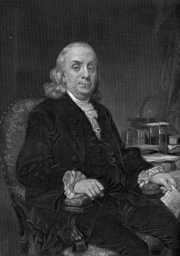
|
| Benjamin Franklin |
the French did not scruple to stir up massacres and Indian warfare. All wars are expensive, the French and Indian war particularly so. After defeating the French, the British were put to the protracted expense of building frontier defenses. Although the British were anxious to attract English-speaking colonists who would defend America for England, it was obvious some of the settlers were becoming very rich. Surely these people could not object to paying taxes for their own defense. In retrospect, it seems remarkably naive of the British to think it was that easy. Americans did not want to pay taxes because they did not want to pay taxes. They settled on the stance of "No taxation without representation" and like Franklin and the Penn family, many really believed in it. That slogan was particularly effective after it became apparent that Parliament wasn't about to give remote colonists reciprocal power in Parliament to interfere with affairs in the British Isles. With Parliament adamantly refusing to dilute its own power, "No taxation without representation" was a neat rhetorical box which meant, "No taxation." Contemporary English historians now throw up their hands in despair that so few members of George III's government had Burke's vision or even the normal wiles of diplomacy. But that understates the hidden political agenda. Parliament just pushed ahead with fairly nominal taxes, but they did so to curtail the independence of colonial legislatures.
The Stamp Act of 1764. It could be argued that Navigation Acts nothing new; earlier versions were first passed in 1651, intended to thwart Dutch trading. They prohibited foreign trade with the British home islands. After fifty years in 1703 similar restraints were extended to trade with the colonies, particularly molasses in the Caribbean area. No outcry was made as these restraints, aimed at retaining the Britishness of British colonies, were occasionally modified and extended over the next sixty years.
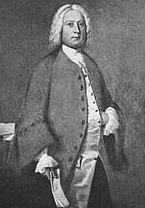
|
| Thomas Penn |
After a century in 1764, however, the Stamp Act was passed, producing modest revenue but imposing a crippling set of headaches by requiring special papers to transact private business. The uproar was enormous and legitimate, focused mostly on the tangle of red tape needlessly imposed. By shifting taxation from trade to paperwork transactions, suspicions were plausible that the Ministry was scheming something obscure. The Stamp Act was hastily repealed, even before Benjamin Franklin and Thomas Penn recognized its unpopularity and were still to some extent defending it in 1766. Franklin apparently saw the Stamp Act as an opportunity to appoint his friends as stamp agents. Local uproar in Pennsylvania was apparently orchestrated by William Bradford, who in addition to having been Franklin's former competitor in the printing business, was the owner of the London Coffee House at Front and Market. No other prominent colonial leader seems to have been involved in the agitation, and it is remotely conceivable that uproar originated with Bradford alone. More likely, Bradford was merely an opportunist in a genuinely popular uprising. With the familiar maneuvering characteristic of politicians, Franklin took popular credit for defeating the Stamp Act with some skillful criticism of it, while John Penn gained credit with the King for representing Pennsylvania's relative calm about it, compared with other colonies. In Pennsylvania at least, the uproar quickly subsided after the repeal of the Act.
The Townshend Navigation Acts of 1768.In 1766 the Grenville Ministry was replaced by that of Rockingham, then soon by Pitt, who were anxious to disavow the unpopular Stamp Act, but nevertheless needed colonial revenue, and needed a few unpleasant laws to prove that Parliament could not be intimidated by colonial squawking.
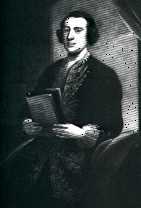
|
| Charles Townshend |
Charles Townshend, the brilliant, vindictive, Chancellor of the Exchequer then proposed taxes on glass, painter's lead, paper, painter's colors, and tea. The underlying political purpose of these taxes was to provide revenue for paying British colonial administrators directly, rather than depend on the Colonial legislatures to pay them. The Legislatures had long played a game of withholding payments, sometimes even the salaries of Judges and Royal Governors, when they disapproved of projects devised in London. The very predictable uproar provoked by the Townshend Acts propelled John Dickinson into prominence with a pamphlet called Letters From a Pennsylvania Farmer, which popularized the idea of "nonimportation", essentially a boycott of British products. Unintentional nonimportation was in fact the effect of the laws, clogging the ports with paralyzed trade goods. Rather than Dickinson's lofty principles, a little-noticed act of 1764, prohibiting the printing of paper money, paralyzed trade. There simply was not enough available coinage to pay these taxes, which finally pushed the primitive transaction system beyond its capabilities. From the viewpoint of modern economics, a heavy unbalance between imports and exports could not be rebalanced by flows of capital. The disastrous Townshend Acts were mostly repealed in 1770, but the British government was getting in deeper and deeper, discrediting itself at every turn. To retreat but still save face, they repealed all the taxes except the one on tea.
The Tea Act of 1772. To a certain degree, the uproar over the face-saving tax modifications on tea was a pretext for confused but radical colonists who were spoiling for a fight about difficulties they tended to personalize. The act actually lowered the effective taxes on tea, and at first Whig radicals were hard put to find a reason for outrage about lowering the price of tea. However, Bradford and his London Coffee House cronies (Mifflin, Thomson) were imaginative, and soon stampeded a mob scene in Philadelphia, where for a time the populace had seen nothing to get worked up over. Rush and Dickinson joined the chorus; the public feeling was stirred to a frenzy not easily reversed.
The really substantive issues involved were created by several years of Townshend Duties and other forms of import restriction. Laws to ensure the Britishness of British colonies created pleasant opportunities for colonial artisans and craftsmen, difficult hardships for importers. But these dislocations, whether welcome or unwelcome, firmly exposed the underlying truth that they caused all colonists to pay higher prices for goods. Adam Smith was not to publish his Wealth of Nations until 1776, so in this case the proof preceded the theory. The colonists were effectively asked to pay higher prices for everything, in order to increase Britishness and to billet soldiers they could not command. Once that cat was out of the bag, attitudes could never be the same. On the English side of the ocean, the question was framed as colonist unwillingness to contribute to the cost of their own defenses. The two slanted perceptions hardened to the point where arrogance confronted defiance, suggesting combat to both of them.
In the case of tea, taxes and import restrictions were intended to promote English tea over Dutch tea; in fact, they stimulated smuggling. Smuggling grew to a point that vast quantities of tea were stranded in the warehouses of the British East India Company, and trade balances of the British Empire were undermined. By reducing taxes, Parliament made East India tea cheaper than smuggled tea. Going perhaps one step too far, middle-men in the tea import business were cut out of the loop by appointing favored direct agents. In Philadelphia, those were Henry Drinker and Thomas Wharton. Bradford and his group immediately set about intimidating these merchants with threats to burn them out, and the sea captains who worked for them, with threats of tar and feathers. The age of Reason was leaving Reason behind.
Originally published: Monday, October 09, 2006; most-recently modified: Friday, September 20, 2019
| Posted by: jan robertson | Mar 22, 2009 8:28 AM |
I think therefore that mest be the standard of your paper.